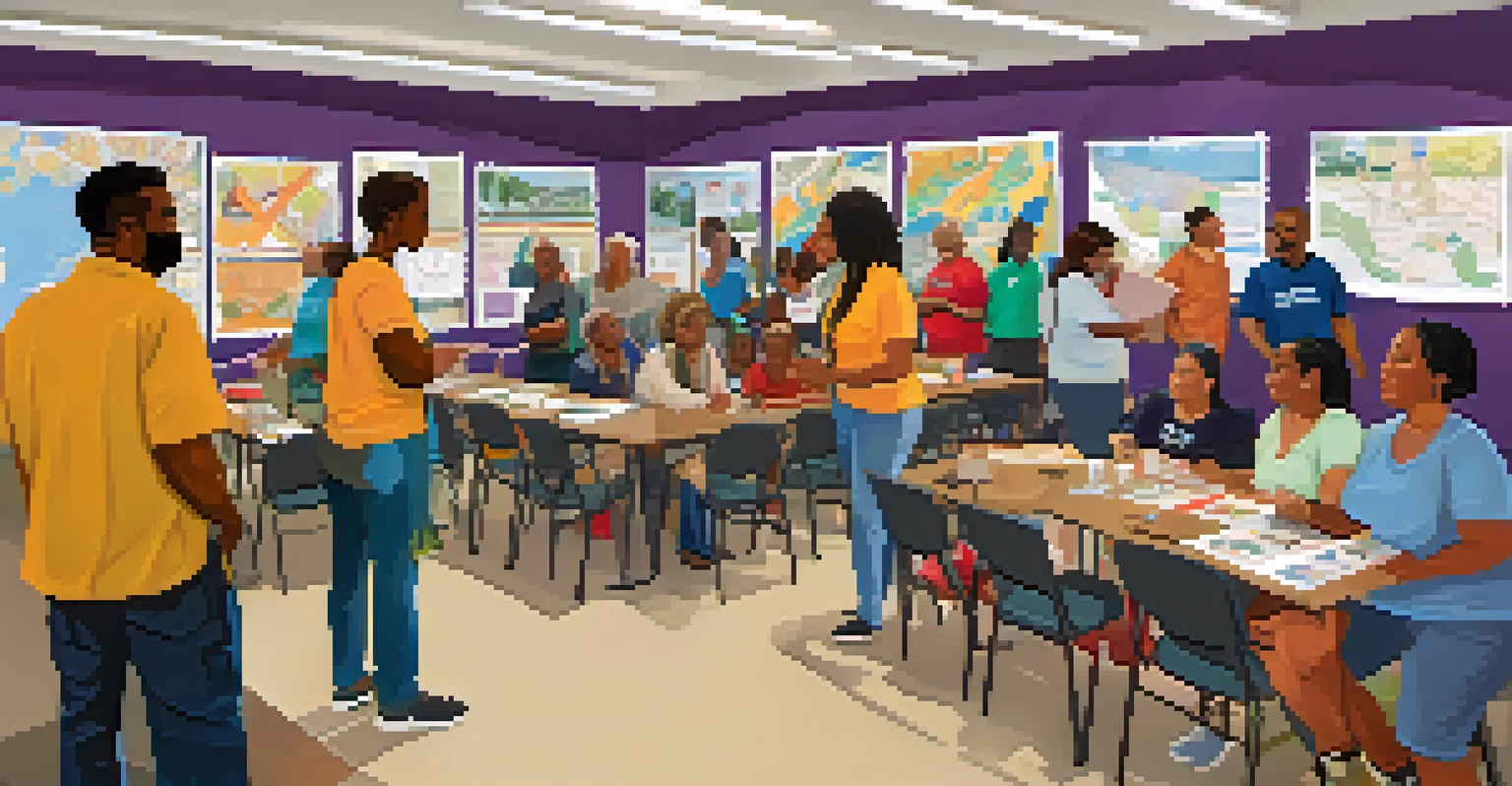Climate Change and Hurricane Intensity in Louisiana

Understanding Climate Change and Its Impact
Climate change refers to long-term shifts in temperatures and weather patterns, primarily caused by human activities like burning fossil fuels. These changes lead to a warmer atmosphere and ocean, creating conditions ripe for more severe weather. In Louisiana, this translates to increased hurricane intensity, which poses significant risks to the state's communities, infrastructure, and ecosystems.
Climate change is no longer some far-off problem; it is happening here, it is happening now.
As global temperatures rise, warmer ocean waters fuel hurricanes, making them stronger and more destructive. This phenomenon is not just theoretical; it's evidenced by the increasing frequency of Category 4 and 5 hurricanes making landfall in recent years. Such storms bring higher wind speeds and more intense rainfall, leading to devastating flooding, especially in low-lying areas like New Orleans.
Understanding climate change is essential for Louisiana residents as it shapes not only the frequency and intensity of hurricanes but also long-term recovery strategies. With each hurricane season, the stakes grow higher, and the need for mitigation and adaptation becomes ever more pressing.
Historical Trends of Hurricanes in Louisiana
Louisiana has a long history of hurricanes, with some of the most notable storms recorded over the past century. The devastation brought by hurricanes like Katrina in 2005 and Ida in 2021 serves as stark reminders of nature's fury. These storms have caused widespread damage, loss of life, and long-term economic impacts, illustrating the urgent need for resilient infrastructure and effective emergency response.

Data shows that the intensity of hurricanes hitting Louisiana has increased significantly over the years, aligning with the trends predicted by climate science. Hurricanes are now more likely to reach higher categories before making landfall, resulting in more catastrophic outcomes for the state. This shift is alarming for residents and policy-makers alike, as the implications extend beyond immediate property damage.
Hurricanes Intensify with Climate Change
Rising global temperatures contribute to stronger hurricanes, posing greater risks to Louisiana's communities and infrastructure.
As we analyze historical hurricane data, it becomes clear that preparation and recovery efforts must evolve to address the changing landscape of storm activity. Historical patterns guide future planning, emphasizing the importance of robust emergency management strategies to safeguard lives and property.
The Role of Rising Sea Levels
Rising sea levels, a direct consequence of climate change, exacerbate the impacts of hurricanes in Louisiana. As ocean waters warm and glaciers melt, coastal regions face increased flooding and storm surge during hurricanes. This phenomenon is particularly concerning for Louisiana, where much of the population lives near the coast and relies on fragile ecosystems for protection.
The greatest threat to our planet is the belief that someone else will save it.
When hurricanes make landfall, the elevated water levels can lead to devastating flooding, overwhelming levees and flood control systems. For instance, Hurricane Katrina's storm surge breached levees, leading to catastrophic flooding in New Orleans and surrounding areas. This tragic event highlighted the urgent need for comprehensive coastal protection measures as sea levels continue to rise.
Addressing rising sea levels requires a multi-faceted approach, including restoring wetlands, investing in coastal barriers, and implementing sustainable urban planning. As communities work to adapt to these changes, it’s crucial to engage residents in conversations about the importance of proactive measures to protect their homes and livelihoods.
The Economic Impact of Intense Hurricanes
Hurricanes have a profound economic impact on Louisiana, affecting everything from local businesses to agriculture. The costs associated with recovery and rebuilding can run into billions of dollars, straining state and federal resources. For example, the aftermath of Hurricane Katrina saw an estimated $125 billion in damages, highlighting the financial burden intense storms place on communities.
The economic effects extend beyond immediate destruction; they also disrupt local economies and job markets. Small businesses often struggle to recover, and the agricultural sector faces challenges due to flooding and crop damage. The long-term economic consequences can linger for years, affecting community stability and growth.
Economic Costs of Hurricane Damage
Hurricanes have devastating economic impacts on Louisiana, leading to billions in recovery costs and long-term disruptions to local economies.
Planning for economic resilience is essential for Louisiana's future. By investing in disaster preparedness and recovery strategies, communities can mitigate the financial impacts of hurricanes and work towards a more sustainable economic future.
Community Preparedness and Response Strategies
Community preparedness plays a critical role in mitigating the impacts of hurricanes. Local governments and organizations must develop comprehensive emergency response plans that outline evacuation routes, shelter locations, and communication strategies. Engaging residents in preparedness efforts fosters a culture of readiness, empowering individuals and families to take action when storms approach.
Training and education are key components of effective preparedness strategies. Workshops, drills, and outreach programs can help residents understand the risks associated with hurricanes and the importance of having emergency kits and plans in place. By fostering a sense of community resilience, Louisiana can better weather the storms ahead.
Collaboration among government agencies, non-profits, and community groups enhances response capabilities. By pooling resources and expertise, Louisiana can develop a coordinated approach to disaster management that prioritizes the safety and well-being of its residents.
The Importance of Climate Mitigation Efforts
Mitigating climate change is essential in reducing the intensity of hurricanes and protecting vulnerable communities like those in Louisiana. Efforts to reduce greenhouse gas emissions, transition to renewable energy sources, and promote sustainable practices can have a significant impact on the future of our planet. By addressing the root causes of climate change, we can help prevent further increases in hurricane intensity.
Local initiatives, such as investing in public transportation, energy-efficient buildings, and reforestation projects, contribute to broader climate goals. These efforts not only improve environmental health but also enhance community resilience against severe weather events. Engaging citizens in climate action fosters a sense of ownership and responsibility towards the environment.
Community Preparedness is Vital
Effective emergency response plans and community engagement are crucial for Louisiana residents to mitigate hurricane impacts.
As Louisiana continues to face the challenges posed by climate change, it’s crucial to prioritize mitigation strategies that create a sustainable future. By working together, communities can make a meaningful difference in the fight against climate change and its impacts on hurricane intensity.
Looking Ahead: A Call to Action for Louisiana
As Louisiana confronts the realities of climate change and increasing hurricane intensity, proactive action is essential. Individuals, communities, and government leaders must come together to create a unified response that prioritizes safety, sustainability, and resilience. This collective effort can help safeguard lives and property for future generations.
Advocacy for policy changes at local and state levels is crucial as well. Supporting legislation that addresses climate adaptation and disaster preparedness can lead to more effective strategies in the face of severe storms. Public awareness campaigns can also empower residents to become advocates for their communities, encouraging everyone to play a part in building resilience.

Ultimately, the future of Louisiana depends on our ability to adapt to the challenges posed by climate change. By embracing innovative solutions, fostering community engagement, and prioritizing sustainable practices, we can create a safer, more resilient state ready to face whatever storms lie ahead.